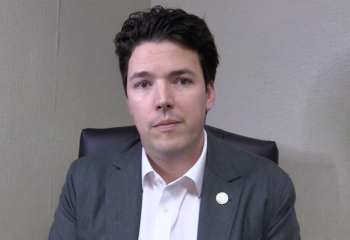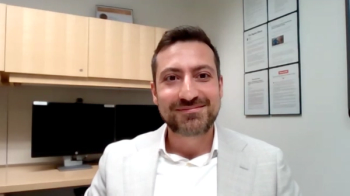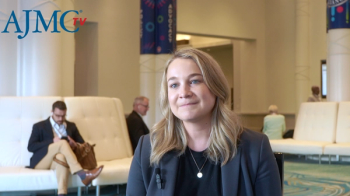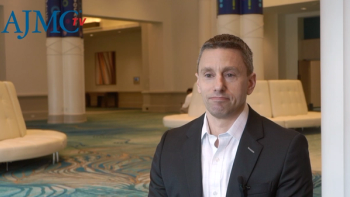
Value-Based Care
Latest News
Latest Videos

CME Content
More News

Robert Kratzke, MD, urged insurance providers to prioritize fast biomarker testing in non–small cell lung cancer, saying it’s both cost-effective and life-saving.

Tyler Sandahl, PharmD, a clinical pharmacist at Mayo Clinic, explains that sequencing novel multiple myeloma therapies with CAR T-cell therapy is generally prioritized first for eligible patients, while bispecific antibodies are reserved for later lines or for patients unable to tolerate CAR T.

To mark the 30th anniversary of The American Journal of Managed Care (AJMC), each issue in 2025 includes a special feature: reflections from a thought leader on what has changed—and what has not—over the past 3 decades and what’s next for managed care. The July issue features a conversation with David J. Shulkin, MD, a physician and former secretary of the US Department of Veterans Affairs.

Tyler Sandahl, PharmD, a clinical pharmacist at Mayo Clinic, discussed the complexities of alternative payment models for chimeric antigen receptor T-cell and bispecific therapies and the need for improved data sharing in cancer care.

Avoiding downstream testing ultimately makes it cheaper for whoever is footing the bill, says Merrill H. Stewart, MD, Ochsner Health.

Nicolas Ferreyros, managing director, Community Oncology Alliance, discusses key components of health equity and social determinants of health that need to be addressed in cancer care.

In 2025, each issue of Population Health, Equity & Outcomes will feature a profile of a health system leader transforming care in their area of expertise. This issue spotlights a conversation with Ken Cohen, MD, executive director of translational research at Optum Health.

Discontinuing the weight loss treatment before hitting the recommended maintenance dose contributes to low-value care despite provider follow-up and efforts to manage side effects, says Hamlet Gasoyan, PhD, Cleveland Clinic.

Coverage from IVBM Princeton, held May 8, 2025.

Supported value-based care improves prenatal care while reducing neonatal intensive care unit stays, preterm birth rates, low birth weight rates, and costs for mothers and infants.

Julia Lucaci, PharmD, MS, of Becton, Dickinson and Company, discusses the benefits of blister packaging for chronic medications, advocating for payer incentives to boost medication adherence and improve health outcomes.

Remote symptom monitoring in cancer care reduces hospitalizations, enhances value-based care, and supports diverse patient populations, according to new findings.

Primary care nurse practitioners were found to use low-value care at lower or relatively similar rates compared with the general clinician population.

Lalan Wilfong, MD, of Thyme Care and Texas Oncology, discusses a session on circulating tumor DNA (ctDNA) and shares insight as chair of the Community Oncology Alliance (COA) Payer Reform Committee.

Kate Baker, MD, MMHC, medical director of value-based care at Tennessee Oncology, talks about innovations in cancer care highlighted at the Community Oncology Conference.

Mike Fazio, director of value-based care at Navista, Cardinal Health, discusses a trending topic at the 2025 Community Oncology Conference: optimizing oncology care with technology.

Accountable care organizations (ACOs) are increasingly playing the role of data sleuths as they identify and report trends of anomalous billing in hopes of salvaging their shared savings. This mission dovetails with that of CMS, which under the new administration plans to prioritize rooting out fraud, waste, and abuse.

The California-based entities plan to offer new Medicare Advantage (MA) products in select counties by this fall.

This article reviews underlying barriers to health care access and discusses how a value-based diabetes care model could improve patient outcomes and reduce long-term costs.

Neha Kashalikar, PharmD, director of strategic pharmacy consulting, MassHealth, shares key components that makes a value-based contract successful.

To mark the 30th anniversary of The American Journal of Managed Care® (AJMC®), each issue in 2025 will include a special feature: reflections from a thought leader on what has changed—and what has not—over the past 3 decades and what’s next for managed care. The April issue features a conversation with Hoangmai H. Pham, MD, MPH, a member of AJMC’s editorial board and the president and CEO of the Institute for Exceptional Care (IEC).

Strategies to enhance virtual care through quality assurance frameworks, technological innovation, and provider support were laid out in a pair of posters presented at the recent AMGA Annual Conference.

Mapping care management needs by defining patient populations and then stratifying them according to risk and their needs can help to spur the transformation of a siloed health care system into an integrated system that is able to better provide holistic, value-based care despite the many transitions that continue among hospital, primary, specialty, and community care environments.

This commentary explains why comparing a launch price with a value-based price from a cost-effectiveness analysis requires further examination.

Although the gap between low and high value has been established in many areas, insurance design has yet to adapt, according to a panel at the 20th annual Value-Based Insurance Design (VBID) Summit.











